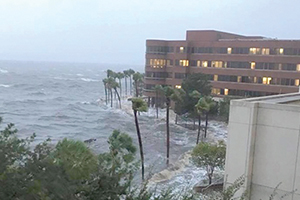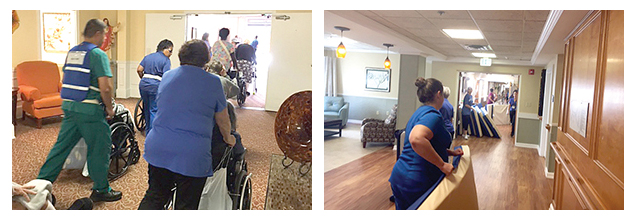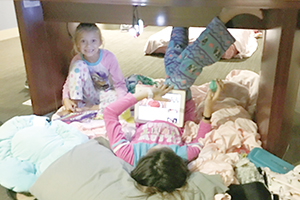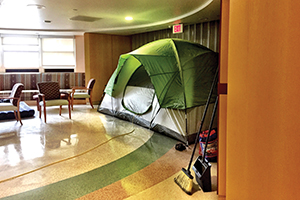By JULIE MINDA
Ministry facilities in Florida communities impacted by Hurricane Irma now are in recovery mode, repairing damage to their campuses and offering financial and emotional aid to employees whose homes were damaged by wind or water.

The St. Johns River lashes St. Vincent's Medical Center Riverside in Jacksonville, Fla., on Sept. 11 during Hurricane Irma's storm surge.
Irma had wreaked havoc on some Caribbean islands before hitting the Florida Keys Sept. 10 as a Category 4 storm with wind speeds of 130 miles per hour. It traveled up the western coast of Florida with hurricane-force winds before weakening into a tropical storm Sept. 11 in northern Florida and continually losing force while moving northwest and inland.
In the days prior to the storm's U.S. landfall, meteorologists, media outlets and government leaders had issued dire warnings about catastrophic wind speeds, massive storm surges and the potential for widespread destruction. Early on, the storm's predicted path put much of the state in danger, and local authorities had about 6.5 million people in Florida under mandatory or voluntary evacuation.
While Irma did not exact the level of destruction that had been predicted, it caused widespread damage in the Florida Keys, and pockets of damage in numerous communities along or near the Gulf and Atlantic coasts. According to news sources, Irma caused at least 34 deaths in the U.S.; it triggered power outages for at least 5.4 million people in the southeast U.S.; and it may have caused up to $65 billion in property damage in the U.S., including for homes and businesses destroyed by flooding or wind.

Staff at Bon Secours Maria Manor nursing home in St. Petersburg, Fla., evacuate patients in advance of Hurricane Irma. Bon Secours St. Petersburg Health System said 310 residents of the nursing facility and the adjacent Bon Secours Place assisted living facility spent five days at the St. Jude the Apostle Cathedral and school while waiting out the storm. Bon Secours moved all the residents' mattresses to the temporary quarters, and about 150 staff stayed at St. Jude with the patients and residents.
About a dozen ministry hospitals and numerous other ministry sites operate in Florida. All those hospitals remained operational throughout the storm. Some sustained minor damage — with flooding causing most of that damage; some had to evacuate patients; and some tackled minor power issues that did not affect patient care.
Late September found all ministry facilities fully operational and working to aid employees and community members harmed by flooding, wind damage, power outages, food shortages and other residual effects.
Gearing up
As Irma gained strength over the Atlantic Ocean early last month, Catholic health care providers throughout Florida executed emergency preparedness plans and brought in extra supplies including food, water and medications. They prepared for the possibility of evacuation, battened down their buildings and closely monitored hurricane path projections. Many closed outpatient sites and rescheduled elective procedures.
Ministry providers throughout Florida swung into storm mode. Among them were:
- Holy Cross Hospital in Fort Lauderdale, a Trinity Health facility. The hospital and some of its off-campus facilities sustained wind and water damage, which has been repaired.
- Bon Secours St. Petersburg Health System, a nursing home, assisted living facility and home care agency on the central Gulf Coast, which evacuated all residents for several days, keeping them safe and comfortable.
- Six Trinity Health hospitals in the Tampa-St. Petersburg area. Some of the facilities had minor water damage.
- Ascension's Sacred Heart Health System, a three-hospital system in Pensacola, near the Alabama border. This system prepared for but was not impacted by the storm.
- St. Vincent's HealthCare of Jacksonville, a three-hospital system in the state's northeast corner that is part of Ascension. St. Vincent's Medical Center Riverside and St. Vincent's Medical Center Southside had minor water and wind damage, St. Vincent's Riverside had some facade damage.

St. Vincent's HealthCare of Jacksonville was among ministry facilities that sheltered staff members' families and pets. Relieved of worry over loved ones' safety, employees could concentrate on their jobs during Hurricane Irma.
High waters
Located on the St. Johns River in northeast Florida's Jacksonville, St. Vincent's Medical Center Riverside was vulnerable to flooding from the rising river during Irma's storm surge. In preparation for Irma-related flooding, the city of Jacksonville had delivered seven truckloads of sand to the facility. Hospital and city staff and some community members packed 3,800 sandbags to successfully protect the hospital's power plant.
St. Vincent's Riverside transferred 18 patients before the surge's high tide — most of them critical patients on ventilators or neonatal intensive care unit babies — to its two other local hospitals as a precaution. When Irma hit, St. Vincent's Riverside had about 280 patients; St. Vincent's Southside, about 140; and St. Vincent's Clay County, about 50.
Higher ground
Bon Secours St. Petersburg includes the 274-bed Maria Manor nursing home and memory care unit; the 102-unit Bon Secours Place assisted living facility; and home care services. Since the manor and assisted living unit are in the flood zone of Tampa Bay, Pinellas County's emergency operations center ordered both facilities to evacuate. Three days prior to Irma's landfall, Bon Secours transported 310 residents to higher ground at St. Petersburg's St. Jude the Apostle Cathedral and school.
Staff used handicapped-accessible buses to move the residents, many of whom are frail elderly and in wheelchairs. Using four rented trucks, Bon Secours moved medical supplies, food, water and equipment, plus all of the residents' mattresses to the new location.
For five days, approximately 150 staff members representing every department at the continuum-of-care facility lived with the residents at St. Jude.
During the duration of the evacuation, residents slept on the mattresses on the floor, with bedsheets strung up between them when privacy was needed.
Karen Reich, chief executive of Bon Secours St. Petersburg Health System, says certified nurse assistants and nurses tended patients, often doing so on their hands and knees.
She says staff "tried to keep our residents occupied and maintain at least some of our usual routine." St. Petersburg Bishop Gregory Parkes visited evacuees during the storm, two priests celebrated Mass, evacuees who are part of Maria Manor's choir sang and the seniors passed the time with bingo games.

A baker at St. Vincent's Medical Center Riverside, Jacksonville, Fla., slept in a tent inside the hospital to be available for dietary department shifts.
Reich says residents remained upbeat and cheerful throughout the relocation. All returned safely to a fully operational — and undamaged — facility Sept. 12. Residents wrote a thank you letter to staff for keeping them safe. (Read that letter here.)
Patient influx
Some of Trinity Health's six Tampa-St. Petersburg-area hospitals saw a busy lead-up to the storm as other local facilities closed and evacuated. The Trinity facilities worked closely with physicians to discharge as many patients as they safely could, to free up beds for the newcomers. Many of the new arrivals were patients needing access to uninterrupted electricity or oxygen.
Prior to the storm, St. Joseph's Women's Hospital took in five neonatal intensive care unit babies from a hospital that was under flooding threat.
According to information from the Trinity hospitals, it was a challenge to discharge medically cleared inpatients and ER patients in the storm's wake, to make room for new arrivals. The patients weren't certain what they would be going home to. But, hospital staff accommodated patients in lobbies and waiting areas until they could return home. Staff also ensured discharged patients had three days-worth of medication.
Pre-storm surge
Prior to the storm, Trinity's Holy Cross Hospital in Fort Lauderdale on the Atlantic Coast had staffed up in anticipation of long working hours while riding out the storm. The 557-bed hospital released patients who physicians said were medically cleared, and who could safely return home. The hospital had 250 inpatients when Irma hit.
After the storm, Holy Cross experienced a significant spike in emergency department visits, including by patients with lacerations, heat-related conditions, and by those seeking dialysis and supplemental oxygen. Holy Cross President and Chief Executive Dr. Patrick Taylor noted the hospital was unable to discharge numerous patients immediately after the storm because nursing homes, assisted living facilities and individual homes had no electricity.
|
Holy Cross responds to amplified hunger concerns post-Irma
By JULIE MINDA
Holy Cross Hospital of Fort Lauderdale, Fla., has focused much of its Hurricane Irma recovery work on relieving hunger in its Broward County home.
According to information from the hospital, food insecurity is an ongoing concern in that county. Statistics from the nonprofit food bank Feeding South Florida indicate that as of 2015, 15 percent of the population of Broward County is food insecure, "with 266,920 people not knowing from where they will get their next meal."
Holy Cross President and Chief Executive Dr. Patrick Taylor said, "Hurricane Irma has increased food insecurity in these families due to the lack of available nonperishable goods and limited financial resources."
Information from the hospital indicates that impoverished families' situations worsened post-Irma because many had unpaid time off from their jobs, when their workplaces were impacted by the storm. Many of the families rely heavily on free lunch programs, but since many schools were closed immediately after the storm, the students could not receive the free lunches. Also, in some areas, power outages made it impossible for people receiving Supplemental Nutrition Assistance Program aid to use their debit-like cards. Also, while there were many organizations working to provide food aid post-storm, some of the food was not getting to some of the people who needed it, and some families were reporting that they were going hungry, according to the information from the hospital.
To help address these concerns, Holy Cross worked on several fronts to get food assistance to food-insecure community members.
Holy Cross' community outreach and its infectious disease group undertook an expansive food aid effort in Irma's wake, delivering food and water to people in need.
Some community outreach staff joined other volunteers at a high school to serve 500 meals to hungry people.
Also, the community outreach department teamed with other local organizations to host a recovery fair, which included food trucks serving complimentary hot meals, a health station, kids' activities and a water distribution center. The event provided 4,835 meals to hungry residents. At the event, Holy Cross staff aided diabetics who'd run out of test strips, patients who had run out of medications and people with other health issues.
Taylor said Holy Cross put such a heavy focus on food aid because its leaders understand that "inadequate nutrition has a direct impact on our community's well-being and further increases health disparities." For this reason, food aid will remain a priority in Irma's wake and thereafter, he said.
|
|
Ministry sites shelter staff's loved ones as well
To allay staff members' concerns for their children and pets during potentially dangerous weather events where their services are required at hospitals, many ministry facilities invite essential employees to bring their two-legged and four-legged family members to work.
Among the ministry sites that did so during Hurricane Irma were St. Vincent's HealthCare of Jacksonville, Fla., and five Trinity Health hospitals in the Tampa-St. Petersburg area of Florida.
As part of St. Vincent's severe weather policy, the system's three hospitals allow working staff to bring their children to the hospital, and two allow them to bring pets. During the storm, St. Vincent's three hospitals sheltered 143 children and 38 pets, providing them with a safe place to stay and food. The health system said a total of 1,389 associates slept at the hospitals during the storm emergency to be available for shifts. The system provided more than 11,000 meals over a four-day period.
Children played in a staff supervised "hurricane camp" while their parents worked and rejoined their parents at shift's end. Pets were housed in a pet care area, with a sitter present at all times. Off duty associates were able to visit their pets.
Trinity hospitals in Tampa Bay also welcomed the children and pets of staff working on its hospital campuses during the storm. The hospitals served free food and had sleeping areas for their staff members and their families. Combined, the six Trinity sites in the Tampa Bay area sheltered 1,114 family members — most of them children, but some of them spouses — as well as 366 pets.
Bon Secours St. Petersburg Health System of St. Petersburg, Fla., evacuated all of the residents of its nursing home and assisted living site to a Catholic cathedral and school campus. At the evacuation site, Bon Secours provided sitters, meals and activities for about 20 children of staff members during the several days that schools were closed due to power outages, staffing issues and damage.
|
|
Ministry facilities help employees, community members recover
When Hurricane Irma damaged property and triggered outages that exacerbated precarious financial situations for many low-income Florida residents last month, members of the ministry responded.
Bon Secours Health System donated $50,000 to Food for America and $10,000 to the Salvation Army — the two nonprofit aid organizations are providing food and other immediate relief to people in south Florida impacted by Irma. The Marriottsville, Md.-based system is collecting employee donations for disaster relief in Florida. Anyone can contribute to the collection by going online to bsvaf.org/Irma.
Ministry facilities in Florida provided emergency assistance funds to employees working to stabilize their living situations after storm-related displacements.
By Sept. 21, Jacksonville's St. Vincent's HealthCare hospitals had assisted 60 employees with money, food, temporary housing and other aid. Others can aid associates by visiting jaxhealth.com/foundation/hurricane-irma-relief.
By Sept. 22, Holy Cross Hospital in Fort Lauderdale, part of Trinity Health, had provided $9,200 for food purchases to 184 staff members, and $21,300 in financial aid to assist 71 staff with rent and utility bills. To support this effort, contributions can be made to the Catherine McAuley Fund. They can be mailed to c/o Sister Rita Levasseur, RSM; Holy Cross Hospital; 4725 North Federal Highway; Fort Lauderdale, FL 33308.
Immediately after the storm, Trinity's six Tampa-St. Petersburg hospitals were offering financial assistance and pastoral and spiritual care to employees impacted by Irma. The facilities were determining the extent of employees' needs in late September. Those who wish to donate to help employees of the hospitals can visit stanthonysfoundation.org for the St. Petersburg hospital or sjhfoundation.org for the five Tampa hospitals.
|
Copyright © 2017 by the Catholic Health Association
of the United States
For reprint permission, contact Betty Crosby or call (314) 253-3490.